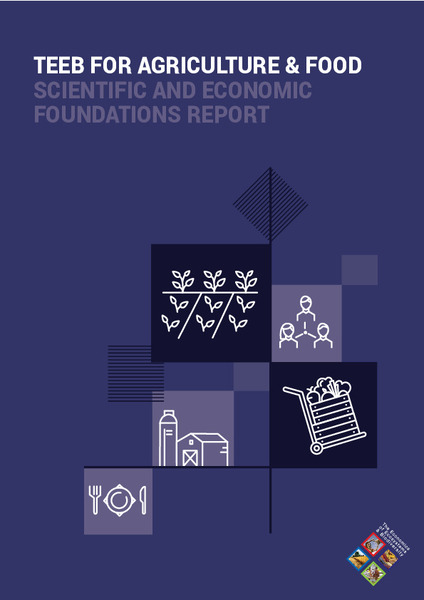| dc.contributor | Ecosystems Division | en_US |
| dc.contributor.author | United Nations Environment Programme | en_US |
| dc.contributor.other | Wenzel, Dustin M. | en_US |
| dc.contributor.other | O’Neill, Shannon | en_US |
| dc.date.accessioned | 2024-07-25T12:13:21Z | |
| dc.date.available | 2024-07-25T12:13:21Z | |
| dc.date.issued | 2018-06 | |
| dc.identifier.isbn | 978-92-807-3702-8 | en_US |
| dc.identifier.uri | https://wedocs.unep.org/20.500.11822/45989 | |
| dc.description | The TEEBAgriFood ‘Scientific and Economic Foundations’ report addresses the core theoretical issues and controversies underpinning the evaluation of the nexus between the agri-food sector, biodiversity and ecosystem services and externalities including human health impacts from agriculture on a global scale. It argues the need for a 'systems thinking' approach, draws out issues related to health, nutrition, equity and livelihoods, presents a Framework for evaluation and describes how it can be applied, and identifies theories and pathways for transformational change. | en_US |
| dc.format | pdf | en_US |
| dc.language | English | en_US |
| dc.publisher | United Nations Environment Programme | en_US |
| dc.rights | Public | en_US |
| dc.subject | agricultural economics | en_US |
| dc.subject | food and nutrition | en_US |
| dc.subject | biodiversity | en_US |
| dc.subject | ecosystem | en_US |
| dc.subject | natural area | en_US |
| dc.subject | landscape | en_US |
| dc.subject | ecosystem | en_US |
| dc.title | TEEB for Agriculture & Food: Scientific and Economic Foundations Report | en_US |
| dc.type | Publications | en_US |
| dc.type | Technical Reports | en_US |
| wd.identifier.sdg | SDG 2 - Zero Hunger | en_US |
| wd.identifier.sdg | SDG 3 - Good Health and Well-Being | en_US |
| wd.identifier.sdg | SDG 11 - Sustainable Cities and Communities | en_US |
| wd.identifier.sdg | SDG 12 - Responsible Consumption and Production | en_US |
| wd.identifier.sdg | SDG 13 - Climate Action | en_US |
| wd.topics | Nature Action | en_US |
| wd.identifier.pagesnumber | 414 p. | en_US |
| dc.relation.TableOfContents | Chapter 1. TEEB for Agriculture & Food: background and objectives | en_US |
| dc.relation.TableOfContents | Chapter 2. Systems thinking: an approach for understanding ‘eco-agri-food systems’ | en_US |
| dc.relation.TableOfContents | Chapter 3. ‘Eco-agri-food systems’: today’s realities and
tomorrow’s challenges | |
| dc.relation.TableOfContents | Chapter 4. Human health, diets and nutrition: missing links
in eco-agri-food systems | |
| dc.relation.TableOfContents | Chapter 5. Social equity, justice and ethics: missing links in
eco-agri-food systems | |
| dc.relation.TableOfContents | Chapter 6. The TEEB AgriFood Framework: towards comprehensive evaluation of eco-agri-food systems | |
| dc.relation.TableOfContents | Chapter 7. TEEBAgriFood methodology: an overview of
evaluation and valuation methods and tools | |
| dc.relation.TableOfContents | Chapter 8. Application of the TEEBAgriFood Framework:
case studies for decision-makers | |
| dc.relation.TableOfContents | Chapter 9. The TEEBAgriFood theory of change: from
information to action | |
| dc.relation.TableOfContents | Chapter 10. TEEBAgriFood and the sustainability landscape:
linking to the SDGs and other engagement strategies | |


